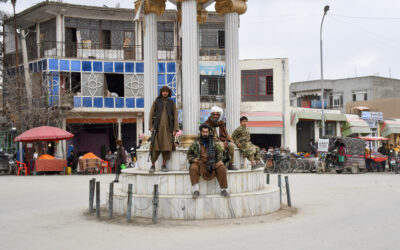Cipher Brief Expert Ambassador Joseph DeTrani is former Special envoy for Six Party Talks with North Korea and former CIA director of East Asia Operations. He also served as the Associate Director of National Intelligence and Mission Manager for North Korea and as the Director of the National Counter Proliferation Center. He also served as a Special Adviser to the Director of National Intelligence.
EXPERT PERSPECTIVE — This year’s Annual Threat Assessment by the US Intelligence Community is a must-read for all Americans. It is a relatively succinct – 27 pages – analysis of the major country-specific and transnational issues that currently affect our national security.
One of the many strengths of our system is the transparency the public expects from our government to provide routine and timely updates on the status of the threats and how they are being managed. We also need a responsible media disseminating this information to the public.
COVID-19 was the most severe national security threat to the U.S. over the past year, with over 569,000 deaths and more than 31 million people infected. Indeed, as we recover, plans must be in place to prevent or be better prepared to respond to another pandemic, while ensuring that we prevent any rogue state or terrorist organizations from using a biological weapon against the U.S. or its allies.
The countries cited in this year’s assessment – China, Russia, Iran and North Korea – all require immediate attention. Great power competition with China is an immediate issue, dealing with humanitarian, military, economic and diplomatic issues that will be with us for decades. Is peaceful co-existence with a near-peer competitor possible? Can a myriad of issues with China – Xinjiang, Tibet, South China Sea, Hong Kong, Taiwan, intellectual property theft –be resolved? Will China cooperate with the U.S. on climate change, North Korea and trade and market access issues?
Will Russian President Vladimir Putin cease and desist with Russia’s intimidation of Ukraine, its imprisonment of Opposition leader Alexei Navalny, adventurism in Iraq and Syria and its manipulation of social media and use of Cyber for illicit purposes?
Will Iran comply with the nuclear agreement, assuming the US returns to the Joint Comprehensive Plan of Action (JCPOA)? Will Iran cease its aggression in Iraq, Syria, Lebanon and Yemen?
Will North Korea commit to complete and verifiable denuclearization if provided with security assurances, a peace treaty, the lifting of sanctions and a path to normalization of relations with the US?
Russia and China are two of the five recognized nuclear-weapon states. Each is working on hypersonic missiles to defeat missile defense capabilities and possibly deliver a nuclear weapon. China is making advances with quantum computing, artificial intelligence, machine learning and robotics, while increasing its nuclear arsenal. Iran shows no inclination to moderate its adventurism in the Middle East, even if the US returns to the JCPOA. And North Korea may resume nuclear and missile tests, despite the reported successful thermal nuclear test and Intercontinental Ballistic Missile (ICBM) launches in 2017.
Confrontation, by design or through miscommunication, with each of these countries is possible. Updates to the public on diplomatic progress or relapses with these countries, and others, should be routinely provided. History tells us clearly that stumbling into conflict that could escalate quickly is always a possibility.
The Cipher Brief is proud to present an all-virtual International Summit. Join us for three days of expert-led sessions on China, western alliances, Intelligence, Space, and emerging technologies. Registration is free for Cipher Brief members.
Diplomacy in dealing with each of these countries is important. The dialogue with China, which has started with climate change, could succeed in resolving some of the issues of concern to the US and its allies, while, also, permitting China to show goodwill by cooperating on issues dealing with North Korea, trade and market access. The five-year extension to the New Start Arms control treaty with Russia could lead to greater reductions in nuclear weapons, with the possibility of a broader discussion of Russian military activities in the Middle East. And diplomatic re-engagement with Iran and North Korea could reduce tension and hopefully facilitate progress with nuclear negotiations.
The transnational issues in the Threat Assessment –Cyber, illicit drugs and organized crime, global terrorism, migration, emerging technology and climate change – are all priority issues requiring immediate attention. Cyber crime estimates, perpetrated by state and non-state actors, are in the trillions of dollars. International criminal groups are involved in drug trafficking, with illicit drugs killing hundreds of thousands of people each year, while also involved in migrant smuggling and human trafficking. Al Qaeda, ISIS and other terrorist groups continue to mount attacks – over 8,000 attacks, with significant fatalities reported in 2019 – against governments and civilians. And some of the emerging technologies, like artificial intelligence and robotics, can be used for military and civilian surveillance purposes.
These are just some of the national security issues affecting the US. Each impacts the well-being of all Americans. And that means the public has a need-to-know what the government is doing to address, mitigate and prevent these country-specific and transnational issues from affecting the security of the U.S.
The annual threat assessment from the Intelligence Community is an excellent annual summary of the international threats. How the government is managing these threats should be the substance of a daily dialogue with the American people.
The views expressed in this publication are the author’s and do not imply endorsement of the Office of the Director of National Intelligence or any other U.S. government agency.
This column by Cipher Brief Expert Ambassador Joseph DeTrani was first published in The Washington Times










